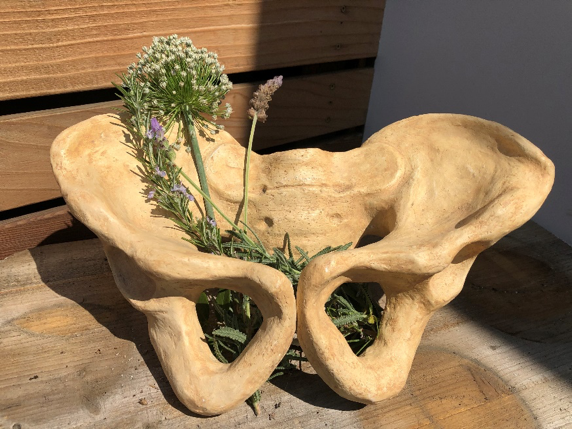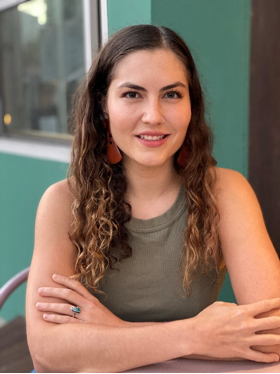In this Featured Member series, AATA celebrates the work of our members. During the coronavirus pandemic, we are inviting members to share their experiences about how their professional and personal lives have changed.
September 24, 2020
What has changed (or remained the same) in your job or studies during the COVID-19 global crisis?
As I finished my last semester in school and practicum, everything changed with the COVID-19 pandemic. School became digital, which was difficult for my close-knit cohort. I believe many of us struggled with the loss of our intimate learning environment but tried to come together as a community as best we could.
In what ways have your clients been impacted by COVID-19?
In my work at the YWCA Glendale, providing resources and support to survivors of domestic violence and their children, it was our duty as an organization to quickly transition to online services. Under magnificent guidance, we mobilized and became one of the first community mental health facilities in LA to provide telehealth and COVID safe care. Providing safe and continued care is critical to our participants who rely on these vital services. The organization also knew the pandemic would, unfortunately, see a rise in instances of intimate partner/domestic violence and knew we would need to provide more support to the community and survivors more than ever. YWCA Glendale is amazing! In transitioning to telehealth, there was a need to cultivate new and creative ways of connecting with our clients. This change led me to reflect on the nature of connection, what components we have historically valued, and how the pandemic experience may alter this understanding.
I have become fascinated with the ways we, as art therapists, have adapted and transformed engagement with and witnessing of the creative process via telehealth-based services. While there are certainly limitations, it has been interesting to consider the innovative opportunities provided by telehealth. Of particular interest to me, has been phone sessions and sessions where the art is visually inaccessible. While the inability to visually access the art-making creates restrictions, it simultaneously provides the unique opportunity to engage through the client’s lens, unobstructed by our inherent biases. On the occasion that a client shares a photo, I have found meaningful personal practice in contrasting what I envisioned of the work from the client’s description, with what I see in the photo. Examining this has provided me with valuable information to learn from and reflect on as a clinician. I hope to mindfully incorporate techniques that allow for more engagement through the client’s lens moving forward in the pandemic and beyond.
Since the killing of George Floyd, the topic of race has once again been brought to the forefront of national dialogue. How have race related issues, social justice, and racism informed or impacted your work as an art therapist?
I have always had a passion for social justice and have wanted to use my privileged voice to amplify, empower, and advocate for those who have been and continue to be silenced, marginalized, and oppressed. The national dialogue as of late has continued to fuel my passion to work in communities.
As a white, cis-gendered woman, I have lived a life of undeniable and extreme privilege in this country. Through my graduate learning at LMU and the teachings of professors Dr. Louvenia Jackson and Anthony Bodlovic, I was introduced to the model of cultural humility which guides my practice. I have learned how our biases, assumptions, and beliefs shape our worldview and how it is of critical importance to examine, reflect and de-construct those worldviews in order to understand our clients and not perpetuate or reproduce oppressive power structures.
A much deeper level of analysis of power and privilege is imperative at both a personal and systemic level if we hope to take the momentum of the current social movement forward and affect real, lasting change. In my efforts to examine, reflect and deconstruct my worldview, I have been called to sit in the discomfort of critically examining the ways in which I may have inadvertently participated in the nourishment of institutional racism and other oppressive systems of power. I must closely consider the many times that my white body has granted me safety, and access to spaces that have remained inaccessible and dangerous for so many others. It is only through a commitment to the lifelong practice of cultural humility that I can strive to cultivate an anti-oppressive and anti-racist practice. I like to remind myself daily that the only “thing I know” is that I don’t “know.” I am always learning. By coming from a place of “not-knowing” I hope to approach everything I do with great humility, curiosity, and understanding. Looking forward, I hope to contribute my work and efforts to cultivate a field that reflects the diversity of the communities we serve.

“Bony Basin” by Caitlin Brosious. Clay, acrylic paint.
“Cradled and contained, yet open and laid bare to the elements. Strong, curious, wounded, and fearful. I am alive. I am quietly screaming, I am loudly screaming. Pleasure, anguish. I am sure, yet wholly unaware.”
Caitlin Brosious, MA, AMFT
 My name is Caitlin Brosious (she, her, hers). In 2008, I moved from Chicago to Los Angeles to attend Pitzer College, where I graduated with a BA in Studio Art/Media studies and a minor in Africana Studies. After graduating, I had the privileged opportunity to spend significant time working on my own mental health. During this time, the field of art therapy fortuitously emerged into the realm of possibility as a career path. The practice felt like the ideal synthesis of my passion for art, experience benefiting from the healing powers of art-making, and my unwavering commitment to social justice. This spring, I graduated with an MA in Marital and Family Therapy with Specialized Training in Art Therapy from Loyola Marymount University and am now a registered AMFT. My brief experience in the field thus far has been meaningfully impacted by the people with whom I have had the privilege of working. It has been my honor to work with survivors of domestic/intimate partner violence, individuals struggling with addiction and experiencing homelessness, young folx in Juvenile Hall, youth in Los Angeles, and community members in Mexico. Through LMU, I also had the opportunity to experience intercultural learning alongside art therapy students in Mexico.
My name is Caitlin Brosious (she, her, hers). In 2008, I moved from Chicago to Los Angeles to attend Pitzer College, where I graduated with a BA in Studio Art/Media studies and a minor in Africana Studies. After graduating, I had the privileged opportunity to spend significant time working on my own mental health. During this time, the field of art therapy fortuitously emerged into the realm of possibility as a career path. The practice felt like the ideal synthesis of my passion for art, experience benefiting from the healing powers of art-making, and my unwavering commitment to social justice. This spring, I graduated with an MA in Marital and Family Therapy with Specialized Training in Art Therapy from Loyola Marymount University and am now a registered AMFT. My brief experience in the field thus far has been meaningfully impacted by the people with whom I have had the privilege of working. It has been my honor to work with survivors of domestic/intimate partner violence, individuals struggling with addiction and experiencing homelessness, young folx in Juvenile Hall, youth in Los Angeles, and community members in Mexico. Through LMU, I also had the opportunity to experience intercultural learning alongside art therapy students in Mexico.
